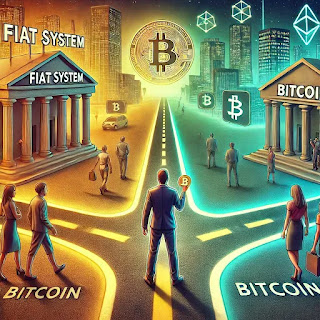What Is Money, Really?
I. Introduction: Stripping Away the Illusions
When most people hear “money,” they think of dollars, coins, or numbers on a bank screen. But those are just costumes—representations of something deeper. If we strip it down to first principles, money isn’t paper or digits. It’s a tool. And not just any tool—it’s the tool humans invented to preserve the value of their work across time.
II. The Core Function of Money
Money serves three fundamental purposes:
Medium of Exchange: It lets us trade without barter.
Unit of Account: It gives us a universal measuring stick for value.
Store of Value: It allows us to carry our effort, time, and resources into the future.
That last function—store of value—is at the heart of it all. One way to think about it: money functions like stored energy. It represents human effort already expended, waiting to be redeemed later.
III. Money as Stored Effort and Energy
When you work, you’re converting your life energy (time, focus, sweat) into value. Money is supposed to capture that value so you can use it later. Think of it as a battery: you “charge” it with today’s work and expect to withdraw the same value tomorrow, next year, or even for your kids in the future.
But if the money system is leaky—through inflation, corruption, or manipulation—your stored value drains away. A paycheck saved in weak money is like storing electricity in a cracked battery.
Of course, money isn’t literally energy—it’s a claim on future goods and services. But the metaphor helps us see why people feel cheated when their savings lose purchasing power.
IV. The Evolution of Money
Barter: Inefficient, requiring coincidence of wants.
Commodities: Salt, shells, livestock—useful but not universal.
Metals: Gold and silver—scarce, durable, widely trusted.
Fiat Paper: Government-issued, easier to use but vulnerable to abuse.
Digital Sound Money (Bitcoin): Borderless, scarce, incorruptible.
Every stage has been humanity’s attempt to solve the same problem: how to carry value safely into the future.
V. The Problem with Fiat
Fiat currency fails at the battery test. Inflation erodes purchasing power year after year. Centralized authorities control supply, meaning your stored value is at the mercy of policy decisions you don’t make. The result? Short-term thinking, debt dependency, and the illusion of growth while savings silently decay.
Fiat money is like running on a treadmill—you see numbers going up, but you’re not moving forward.
VI. Bitcoin and the First Principles Reset
Bitcoin rewrites the rules by aligning money with math and scarcity:
Scarcity: Hard cap of 21 million—no dilution of your stored value.
Censorship Resistance: No permission required to spend or save.
Transparency: Open ledger for anyone to verify.
Time-Proof: Value preserved not by decree, but by cryptographic certainty.
Bitcoin isn’t just digital currency—it’s money returned to first principles. It transforms stored human effort into something incorruptible and borderless.
Of course, there are tradeoffs. Its fixed supply can make it less flexible in responding to economic shocks. But the point of hard money isn’t to smooth every bump—it’s to preserve trust by removing manipulation from the equation.
VII. The Human Side: Why It Matters
Money isn’t just an economic abstraction. It’s how we plan for the future. Good money allows families to save, businesses to grow, and civilizations to thrive across generations. Bad money creates desperation, instability, and short-term grabs at survival.
The question is simple: do you want your life’s work to hold—or to leak?
VIII. Conclusion: Back to First Principles
Money is not paper, coins, or digits on a bank app. It’s the technology humans use to store and transfer value across time and space. History shows we’ve always searched for the best tool to do this. Now we’ve found a new contender.
Bitcoin isn’t the latest fad—it’s the culmination of humanity’s long search for money that actually works. In a world of cracked batteries, Bitcoin is the first vault that doesn’t leak.
Money functions like energy storage. Bitcoin is the strongest vault humanity has ever built.




Comments
Post a Comment